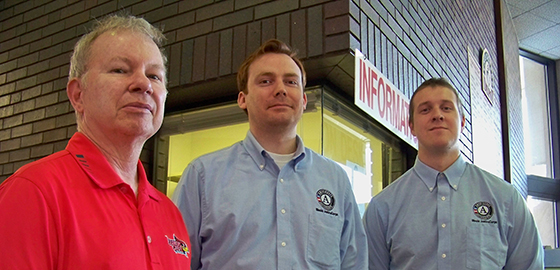The legal system is tough to navigate, especially if you can’t afford an attorney or have never stepped foot in a courthouse. Now, a new program aided by three Redbirds is making it a little easier.
It’s called Illinois JusticeCorps, and its goal is to expand and enhance access to justice for low-income and vulnerable people without lawyers by training college and law students. Bloomington-Normal is the first Illinois community outside Chicago to have a JusticeCorps branch, which is based out of an information desk in the lobby at the McLean County Law and Justice Center in downtown Bloomington.
The local JusticeCorps branch is staffed by a full-time manager, Jon Legg ’08, and three undergraduate volunteers, including two Illinois State students. Since launching in January, they’ve helped visitors fill out paperwork and find the right courtrooms, among other tasks.
For Luke Somogye, a junior criminal justice sciences major from Orland Park and one of the student volunteers, the experience offers a sneak peek of his future career. He’s considering a career in police work, or possibly law school, and JusticeCorps gives him real-world experience in the legal system.
“It’s nice to help everyone, to help guide them through the system,” said Somogye.
Illinois JusticeCorps receives AmeriCorps funding from the Serve Illinois Commission. The JusticeCorps concept began in California and eventually landed in Chicago, with another branch in Markham. The McLean County branch is overseen by Adrian Barr, managing attorney of the Prairie State Legal Services Bloomington office, and by the Chicago Bar Foundation.
In McLean County, the three students volunteer at the courthouse eight hours a week. Additionally, they’ve each been assigned a special research project by Department of Politics and Government Professor Emeritus Robert Bradley, who founded Illinois State’s Pre-Law Advisement Center in 2003.
Somogye, for example, is studying the process for expunging one’s criminal record—research he’s already putting into practice while interacting with courthouse visitors. Another student volunteer is researching how to assess the success of the JusticeCorps program, Bradley said.
The most common questions, Somogye says, are where to find a particular courtroom or court service, or which forms to fill out to, say, seek a divorce. The JusticeCorps team isn’t allowed to give legal advice—they’re undergrads, not lawyers—but there’s still plenty they can do to help.
In the McLean County courthouse’s legal library, JusticeCorps is able to assist with most civil matters by helping fill out the proper paperwork, said Legg, who majored in English at Illinois State and then attended Thomas M. Cooley Law School in Michigan.
One of Legg’s clients was a woman who left her home for a shelter to escape an abusive husband. She had no idea how to seek an order of protection or protected visitation with her children.
“That was kind of a heartwarming experience, to be able to help this woman, who had nothing, kind of find her way through the system,” Legg said.
The need for free legal assistance has only grown since the recession, with a lot of people choosing to represent themselves because they can’t afford an attorney, said Legg. And Bloomington-Normal could serve as an important test case for the JusticeCorps model in smaller communities, Bradley said.
“This is a pretty critical part of the program,” Bradley said.
There is also concern that a sweeping cycle of across-the-board federal budget cuts, known as the sequester, will hit legal aid programs particularly hard, Bradley said.
“The need’s not going to disappear, but you’re going to fill it in some other way,” Bradley said.
Ryan Denham can be reached at rmdenha@IllinoisState.edu.

